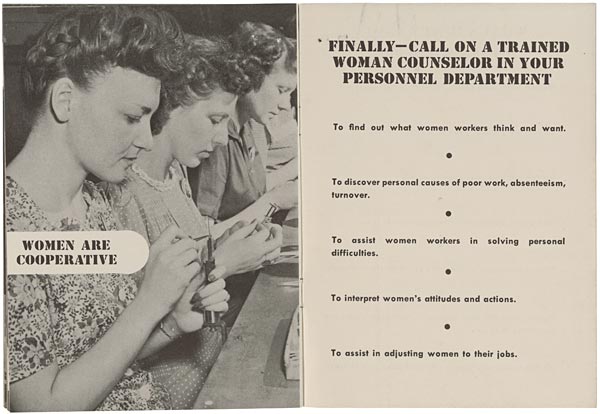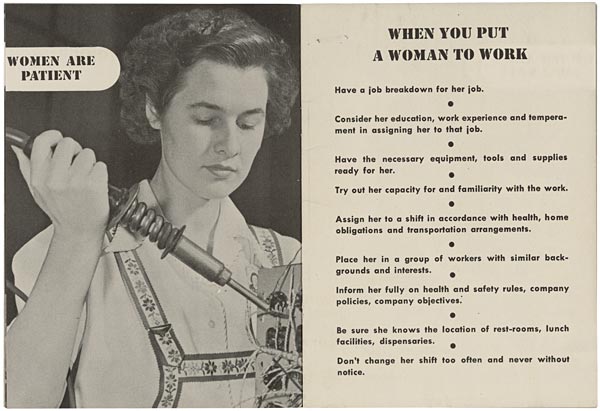Naama Nagar sent in these images from a “booklet that was intended to assist male bosses in supervising their new female employees at RCA plants,” according to the National Archives, Southeast Region (found via Michael Zilberman’s history blog; sorry it’s in Hebrew):
Text:
When you supervise a woman…Make clear her part in the process or product on which she works. * Allow for her lack of familiarity with machine processes. * See that her working set-up is comfortable, safe and convenient. * Start her right by kindly and careful supervision. * Avoid horseplay or “kidding”; she may resent it. * Suggest rather than reprimand. * When she does a good job, tell her so. * Listen to and aid her in her work problems.
Text:
Finally–call on a trained woman counselor in your personnel department…to find out what women workers think and want. * To discover personal causes of poor work, absenteeism, turnover. * To assist women workers in solving personal difficulties. * To interpret women’s attitudes and actions. * To assist in adjusting women to their jobs.
Text:
When you put a woman to work…Have a job breakdown for her job. * Consider her education, work experience and temperament in assigning her to that job. * Have the necessary equipment, tools and supplies ready for her. * Try out her capacity for and familiarity with the work. * Assign her to a shift in accordance with health, home obligations and transportation arrangements. * Place her in a group of workers with similar backgrounds and interests. * Inform her fully on health and safety rules, company policies, company objectives. * Be sure she knows the location of rest-rooms, lunch facilities, dispensaries. * Don’t change her shift too often and never without notice.
These are interesting from a gender perspective, of course, but they’re also sort of fascinating for what they tell us about changing assumptions about what the workplace is (or should be) like. While there were many problems with the World War II (and post-war) workplace, there was also a certain assumption that companies would take care of their employees to some degree in return for employees’ loyalty and hard work. This comes through in instructions such as “Assign her to a shift in accordance with health, home obligations and transportation work” and “Don’t change her shift too often and never without notice.” The idea is that workplaces, including factories, should think about their employees’ lives and how their work schedules fit in with their other obligations, as well as provide things like dispensaries. Now, I’m sure many companies didn’t actually meet these ideals, but this booklet sent out to managers at least acknowledges that they exist. Today, most workplaces don’t even pretend to aspire to such ideals. While some privileged white-collar workers may have options like flexible hours or working from home, many workers find that their hours and schedules change from week to week, making it difficult to arrange child care or work around other obligations. McDonald’s is well known for making workers sign out during slow periods during their shift to keep payroll down (workers are expected to be available, however, should business pick back up) and Wal-Mart has been sued for failing to pay overtime or for asking workers to work off the clock, again to reduce payroll costs.
So these might be useful for a discussion of work and what we expect from the worker-employer relationship. Is it simply a contractual financial exchange? Do workers and employers owe each other anything besides an hour of work and an hour of pay at the agreed-upon price? How have employers pushed concerns about schedule disruptions and payroll reductions off on workers, forcing them to accommodate the company’s needs?
Thanks, Naama!




Comments 12
Tlönista — January 5, 2009
I love the reassurance that WOMEN ARE TEACHABLE. Also, I had to look up "dispensary".
SociologicalMe — January 5, 2009
Other than the "women are teachable" grossness, this mostly leaves me wondering- what was different about how they were treating male workers? Most of this stuff seems applicable to any new worker in any field, regardless of gender. Did they just have to remind bosses that women are human?
Greg Laden — January 5, 2009
The idea is that workplaces, including factories, should think about their employees’ lives and how their work schedules fit in with their other obligations, as well as provide things like dispensaries.
It would be interesting to run this down, to really find out about the intentionality here. I read it very differently. I saw these remarks as addressing two points: a) Female fragility and b) Interference with a woman's role in the family lifeways. Yet at the same time, yes, many of these items (reworded to sound less like we are talking about the family dog) are right out of modern HR models at progressive compaines .
Maybe Google could adapt this for their own use ... :)
Duran — January 5, 2009
For once I agree with this blog's tone! :)
Though it's humorous, in our time and place, to think about special instructions for treating women in the workplace, it makes total sense when viewed in the context of the 1940s. Last year, I took a class on managing employees who come from China (I work in tech), and it highlighted some very useful cultural differences to me that have since made my life a lot easier - and presumably the Chinese employees' lives too. This is just common sense on the part of my management, and hopefully the fact that management in the 40's was attentive to making women feel comfortable shows that it wasn't entirely a dark age for women in the workplace.
However, I think your assessment of today's workplace is excessively grim. It's really not at all that bad out there, and if you look objectively, it is a ton better than in the early part of last century. The biggest abuses seem to be for undocumented migrants who have less social integration and fewer options. Treat good, documented, workers poorly and they will just leave and go work for your competitor. (Well, ok, maybe not in this economy.)
There is always going to be a tension between workers wanting to do less for higher pay, and employers wanting more productivity for less. Most employers seem to strike a pretty good balance. After all, a pissed off worker is more likely to make mistakes, malinger, or just leave. And a too lenient employer that doesn't inspire productivity in its employees is likely to get killed by the competition. It's a healthy tension, especially with government safeguards in place to make sure it doesn't swing too far.
Anyway, good post.
Cecil — January 6, 2009
Duran, your sort of theory only works with skilled or educated workers. Many workers who are disposable do not have these sorts of options, like the McDonald's or Wal-Mart worker previously mentioned since they are so entirely disposable. Nor do many of these workers have the opportunities or resources to just quit a job and find a new one. It is an unfortunate part of our economy.
Duran — January 6, 2009
@Cecil
I don't completely agree. Even at lower skill levels (e.g. grocery store clerks), the difference between a strong and weak employee is pronounced. As a manager of a grocery store chain, you want that clerk who's fast, cheerful, competent in performing transactions, and chips in to help close down. People like that help everyone else work more efficiently. As the manager, if that clerk asked for a particular shift, you'd try to accomodate it - at the expense of possibly stepping on the shift preference of one of your weaker workers, whom you don't care to retain quite so strongly.
I've worked in probably a dozen different industries. One summer in college, I landscaped at a local firm as a crew lead. There was one guy (undoc'd immigrant I'm sure, I never asked) I would have literally taken a pay cut myself in order to keep. He was that good - tirelelessly working, always a high quality job, and somehow seemed to inspire his teammates to work well too. It never came to taking a pay cut from me, since the big boss saw he was that good too and made him happy. But my point is if he asked for a week off, even in the high season, I would have said yes...because he was indispensable.
What I'm getting at is that employers ALWAYS want to retain the strong people. So the difficulty you and the blogger point out isn't so much a conflict between employee and employer, as it is between stronger and wearker employees. It's a jungle out there! No one is equal, and the better ones will be favored.
Sociological Images » HANDLING THE MILLENNIALS — January 14, 2009
[...] that purports to teach employers to handle “Millennials”. It’s similar to a post that Gwen put up about advice to employers for working with women when they initially entered the [...]
Business Memes » HANDLING THE MILLENNIALS — January 16, 2009
[...] that purports to teach employers to handle “Millennials”. It’s similar to a post that Gwen put up about advice to employers for working with women when they initially entered the [...]
hoshi — March 3, 2009
@Duran (even though it's been months and i doubt you'll ever see this.)
i see your point about employers wanting to hold onto good employees, but i do feel the overall attitude has changed. my husband works at Lowe's and has been there for at least 8 years. he is a VERY hard worker and quite knowledgeable about his job.
but he, like everyone else there, is on a rotating schedule. his schedule is completely different from week to week. some days he'll have to be at work by 6 am and will be home past 3pm, and other days he'll go into work at 2pm and return around 11pm. we eat dinner together every night, but it's impossible to create a stable schedule when sometimes dinner is at 7, and sometimes it's past midnight!
i can't even imagine trying to plan family meals with one parent on such a schedule, must less both!
When You Supervise A Woman: How To Train A Woman – A 1940s Factory Brochure | Flashbak — September 22, 2014
[…] Spotter: National Archives, Southeast Region, Society Pages […]
Achod Sepio — April 24, 2022
You may wake up and remove the socks in the middle of the night, but that is better than getting cold feet to https://dltutuapp.com/tutuapp-download/ keep you awake.
Pqaar Deow — April 24, 2022
If trying to sleep when you are not tired https://showbox.run/ is a constant problem in your life, you can change your routine. It might make it easier to fall asleep at night, even if you feel wide awake.